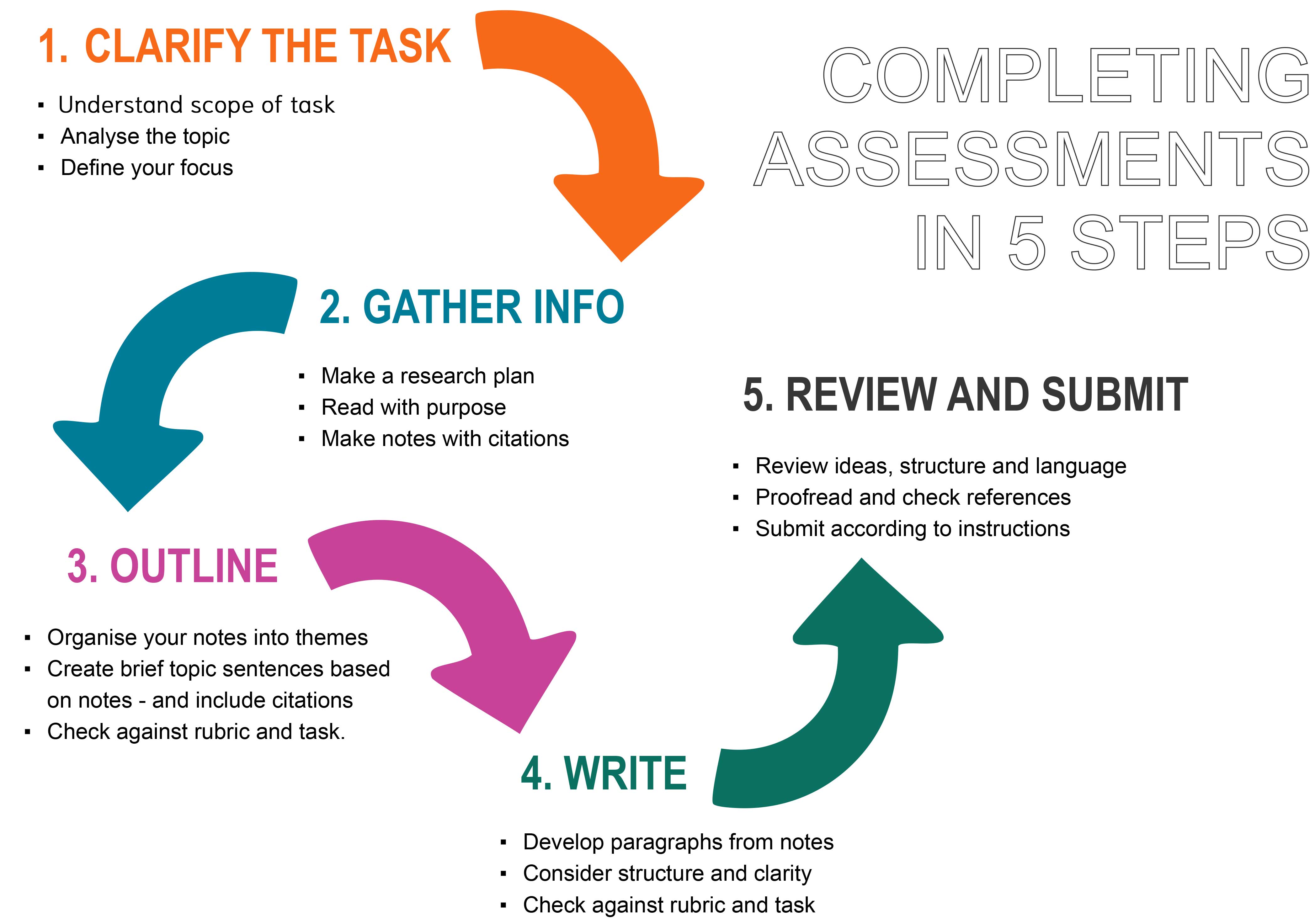Five steps to completing assessments
Our step-by-step guide will help you break down what you need to do in a series of logical steps.
Although assessment requirements will vary, the typical steps required to complete an assessment are often very similar. Finding a process that works for you and creating your own personalised assessment checklist can be a life saver.
Drew Roberts, Specialist, Academic Engagement

Break it down and clarify
- Understand the task. Firstly, find out exactly what you are being asked to do by analysing the task question and the rubric.
- Brainstorm what you already know. Ask yourself how you know this? Do you have credible evidence to back it up?
- Set deadlines. Planning your time and tasks is essential. Divide the assessment into manageable sections or tasks. Allocate time for each section and set your own mini-deadlines.
- Check in. Double-check your unit site, regularly review your unit materials, unit site announcements and discussion forums, and any guidelines that accompany the assessment.
- Ask questions. If anything is unclear, get in touch with your tutor. You can also ask questions via your unit discussion forum. Or ask Study Support.
Research and gather information
- Create a research plan. Are there ideas you need to confirm or find out more about? Incorporate these gaps into your research strategy. A Library search plan can help you stay focussed. Use your unit weekly topics and readings to guide you. Learn more from the Deakin Library about gathering information from textbooks, academic journals, and reputable websites.
- Make notes. Keep a record of your sources and their references. Organise your notes into sub-themes. Keep in mind that your unit’s weekly topics will provide some structure for key themes, issues and questions. Get further tips on note making.
Draft an outline
- Organise your thoughts. Group your information into key points. Develop some preliminary topic sentences for your planned paragraphs. Add your notes and references.
- Structure your ideas. Create a topic sentence for each key point. Order each topic sentence so there will be a logical flow from one paragraph to the next. Are there any gaps or repetitions?
- Ensure the outline is suitable for your assessment type. Essays, reflections and reports can have various structures. Double-check your rubric and task instructions.
Begin writing
- Use your outline to write a draft. You don’t have to start at the beginning. Many people like to wait until the overall structure is clear before writing an introduction. You might like to begin with the section you feel most passionate or knowledgeable about. Trying different approaches to writing will help you discover what works best for you.
- Be prepared to make changes. You might need to return to your research, revise your structure, or even change your opinions as you learn more. Be prepared to let go of a section of writing or a topic, if necessary.
Revise, edit and submit
- Review content. Check for clarity and coherence – try reading your draft aloud. And have you addressed all parts of the task? Check the unit site for any last-minute instructions.
- Finalise and submit. Have you met any formatting requirements set out in the assessment instructions? Which document types are required/permitted? Double-check you’ve met the rubric criteria and included all citations according to your required referencing style. A final spelling and grammar check is recommended.
- Submit on time. Check you work through Turnitin and make any necessary changes. Then ensure you have enough time to submit your assessment before the deadline.
In summary
- Be aware of the different steps required to successfully complete your assessments.
- Preparing is important, but don’t expect to have everything perfectly worked out before you begin.
- Your understanding of the topic will develop as you write. It’s okay if your original plan changes. It’s okay if your outline still has gaps or questions to address.
- Take time to make notes, plan, draft and proofread your work.
- Regularly review assessment requirements and check for any unit announcements.

